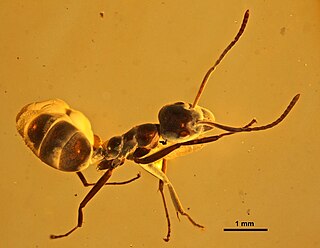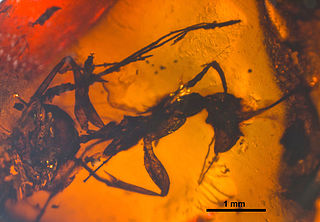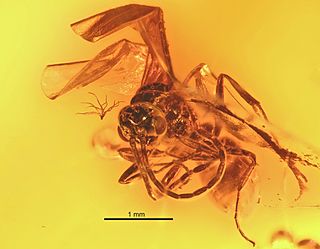
Dolichoderus is a genus of ants found worldwide.
Vladimir Vasilevich Zherikhin, of the Paleontological Institute, Russian Academy of Sciences, Moscow, was one of the world's leading paleoentomologists and coleopterists. He worked on the palaeontology of the Coleoptera (beetles) and of insects in general, and on the taxonomy of the weevils (Curculionoidea).

Yantaromyrmex is an extinct genus of ants first described in 2013. Members of this genus are in the subfamily Dolichoderinae of the family Formicidae, known from Middle Eocene to Early Oligocene fossils found in Europe. The genus currently contains five described species, Y. constrictus, Y. geinitzi, Y. intermedius, Y. mayrianum and Y. samlandicus. The first specimens were collected in 1868 and studied by Austrian entomologist Gustav Mayr, who originally placed the fossils in other ant genera until the fossils were reviewed and subsequently placed into their own genus. These ants are small, measuring from 4 to 6 mm in length and can be characterized by their trapezoidal shaped head-capsules and oval compound eyes that are located slightly to the rear of the capsules midpoint, with no known ocelli present.

Zherichinius is an extinct genus of ants in the subfamily Dolichoderinae known from fossils found in amber from the Middle Eocene of Sakhalin island Far eastern Russia and Bitterfeld, Germany. At the time of description the species Zherichinius horribilis and Zherichinius rapax were two of eight ant species known from Sakhalin fossils.
Dolichoderus brevicornis is a species of ant in the genus Dolichoderus. Described by Dlussky in 2002, remains of the species were discovered in the Baltic Amber.

Dolichoderus longipilosus is an extinct species of Eocene ant in the genus Dolichoderus. It was described by Dlussky in 2002, and the fossils of the species are only known from a fossilised worker that was found in the Baltic amber.
Dolichoderus lucidus is an extinct species of Eocene ant in the genus Dolichoderus. Described by Dlussky in 2008, the fossils of the species were found in the Rovno amber in Ukraine.

Dolichoderus nanus is an extinct species of Eocene ant in the genus Dolichoderus. Described by Dlussky in 2002, a fossilised worker was discovered in the Baltic amber.
Dolichoderus perkovskyi is an extinct species of Eocene ant in the genus Dolichoderus. Described by Dlussky in 2008, fossils of the species have been found in multiple ambers, notably the Rovno amber and the Scandinavian amber.
Dolichoderus pilipes is an extinct species of Eocene ant in the genus Dolichoderus. Described by Dlussky in 2008, fossils of the species have been found in multiple ambers, notably the Rovno amber and the Scandinavian amber.
Dolichoderus polessus is an extinct species of Eocene ant in the genus Dolichoderus. Described by Dlussky in 2002, a fossilised worker was discovered in the Rivne amber.
Dolichoderus polonicus is an extinct species of Eocene ant in the genus Dolichoderus. Described by Dlussky in 2002, a fossilised worker was discovered in the Baltic amber.
Dolichoderus robustus is an extinct species of Eocene ant in the genus Dolichoderus. Described by Dlussky in 2002, a fossilised worker was discovered in the Rivne amber.
Dolichoderus vlaskini is an extinct species of ant in the genus Dolichoderus. Described by Dlussky and Perkovsky in 2002, the fossils were discovered in the Rovno amber, located in Ukraine.
Tapinoma electrinum is an extinct species of ant in the genus Tapinoma. Described by Dlussky in 2002, fossils of the species were found in the Rovno amber in Ukraine, where a fossilised male of the species was described.
Tapinoma glaesaria is an extinct species of ant in the genus Tapinoma. Originally described by Gennady Dlussky in 2002 as Tapinoma aberrans, fossils of the species were found in the Rovno amber in Ukraine. The original specific name was a secondary homonym of Tapinoma aberrans, an extant species from Madagascar. Perrichot, Salas-Gismondi & Antoine (2019) coined a replacement name T. glaesaria for the taxon described by Dlussky.
Aneuretellus is an extinct genus of ant in the formicid subfamily Aneuretinae, and is one of eight genera of the subfamily. The genus contains a single described species Aneuretellus deformis and is known from one Middle Eocene fossil which was found in Sakhalin in the Russian Far East.

Pachycondyla succinea is an extinct species of ant in the formicid subfamily Ponerinae described from fossils found in Europe. P. petrosa is one of three middle Eocene Pachycondyla species found in Baltic amber.

Rovno amber, occasionally called Ukrainian amber, is amber found in the Rivne Oblast and surrounding regions of Ukraine and Belarus. The amber is dated between Late Eocene and Early Oligocene, and suggested to be contemporaneous to Baltic amber. Major exploration and mining of the amber did not start until the 1990s.

Nylanderia pygmaea is an extinct species of formicid in the ant subfamily Formicinae known from fossils found in the Prussian Formation of the Baltic region.







